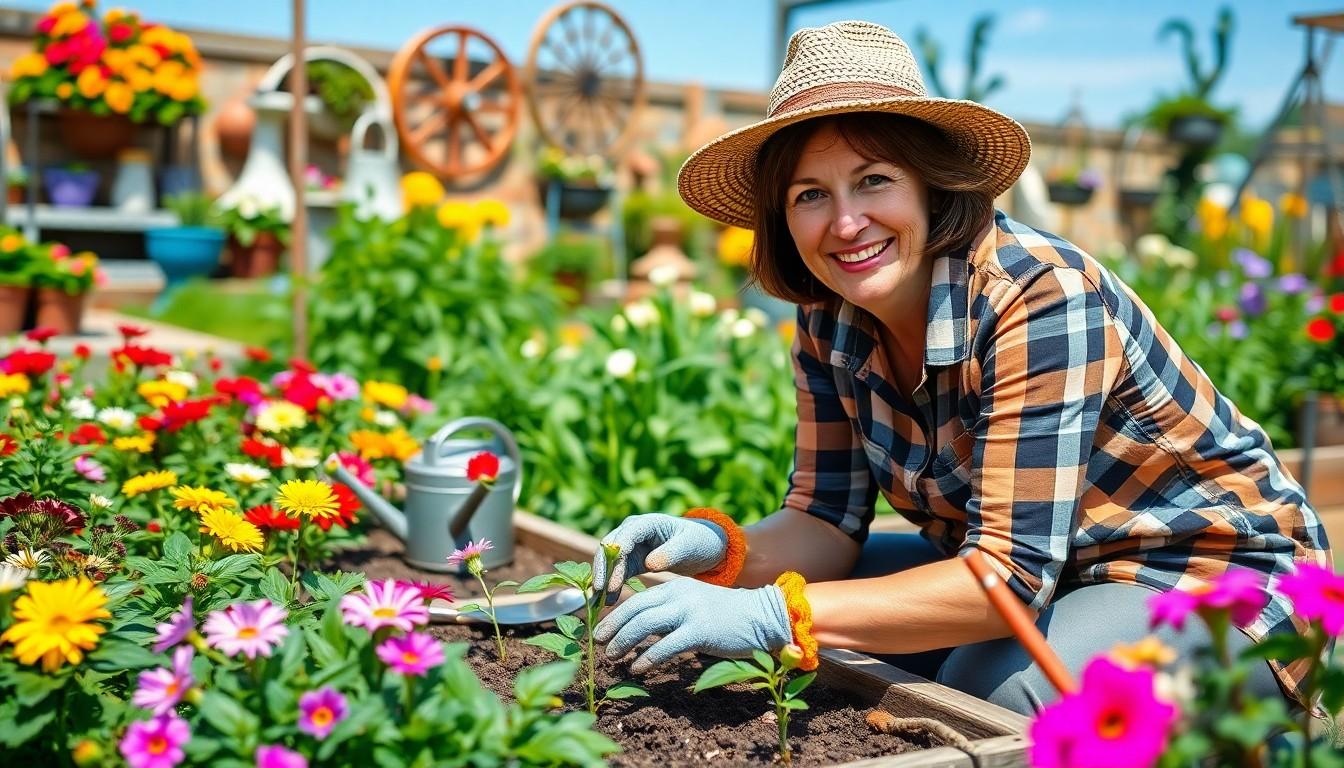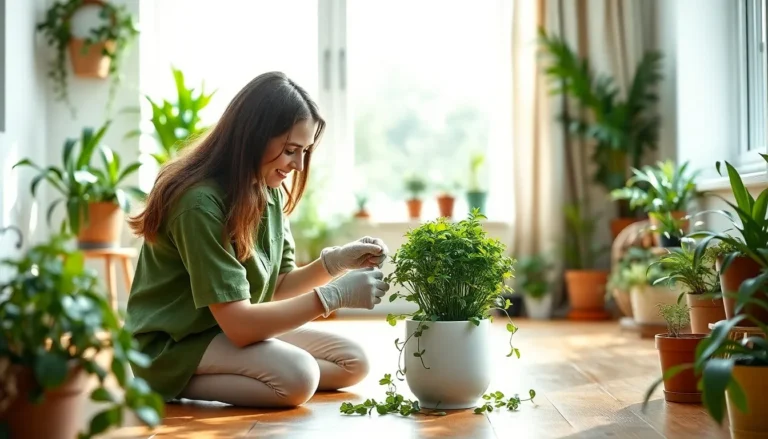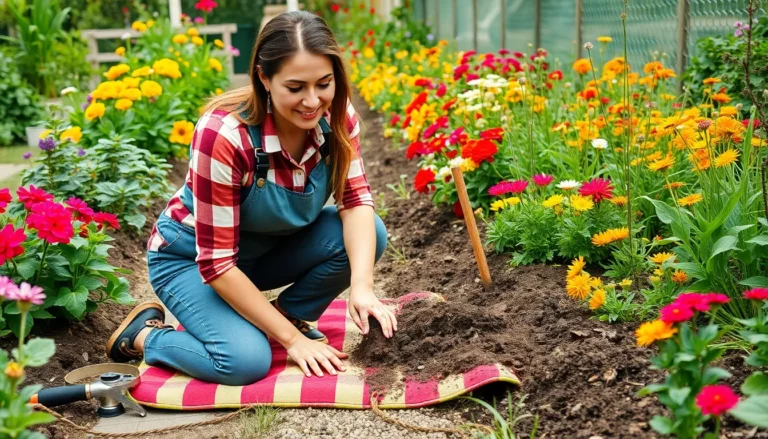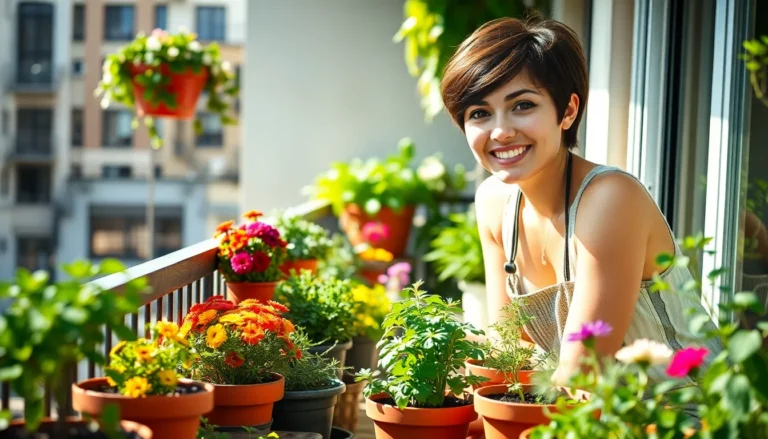Gardening can feel like a never-ending battle against weeds, pests, and the occasional squirrel with a vendetta. But what if there were clever tricks to turn that backyard chaos into a blooming paradise? With a sprinkle of creativity and a dash of humor, anyone can transform their gardening experience from a chore into a joy.
14 Most Clever Gardening Tips and Ideas
Gardening becomes easier with clever tips that make the process enjoyable. Clever strategies can help combat common issues like weeds and pests. Utilizing companion planting offers effective pest control by growing certain plants together.
Incorporating mulch around plants retains moisture and suppresses weed growth. Beneficial insects, such as ladybugs and lacewings, control harmful pests naturally. Rotating crops each season prevents soil depletion and reduces pest infestations.
Creating a compost bin transforms kitchen scraps into nutrient-rich soil. Raised beds improve drainage and make gardening accessible for all ages. Shade cloths protect plants from extreme sunlight while maintaining airflow.
Using natural repellents, such as garlic spray, effectively deters pests without chemicals. Vertical gardening maximizes space, allowing more plants in smaller areas. Experimenting with native plants encourages biodiversity and supports local wildlife.
Planting flowers attracts pollinators like bees and butterflies, essential for fruit production. Watering early in the morning minimizes evaporation and promotes healthy root systems. Storing garden tools in a designated area streamlines the gardening process, saving time.
By implementing these clever tips, gardeners can enhance their experience significantly. Each strategy encourages a thriving garden while reducing common challenges.
Benefits of Clever Gardening Ideas
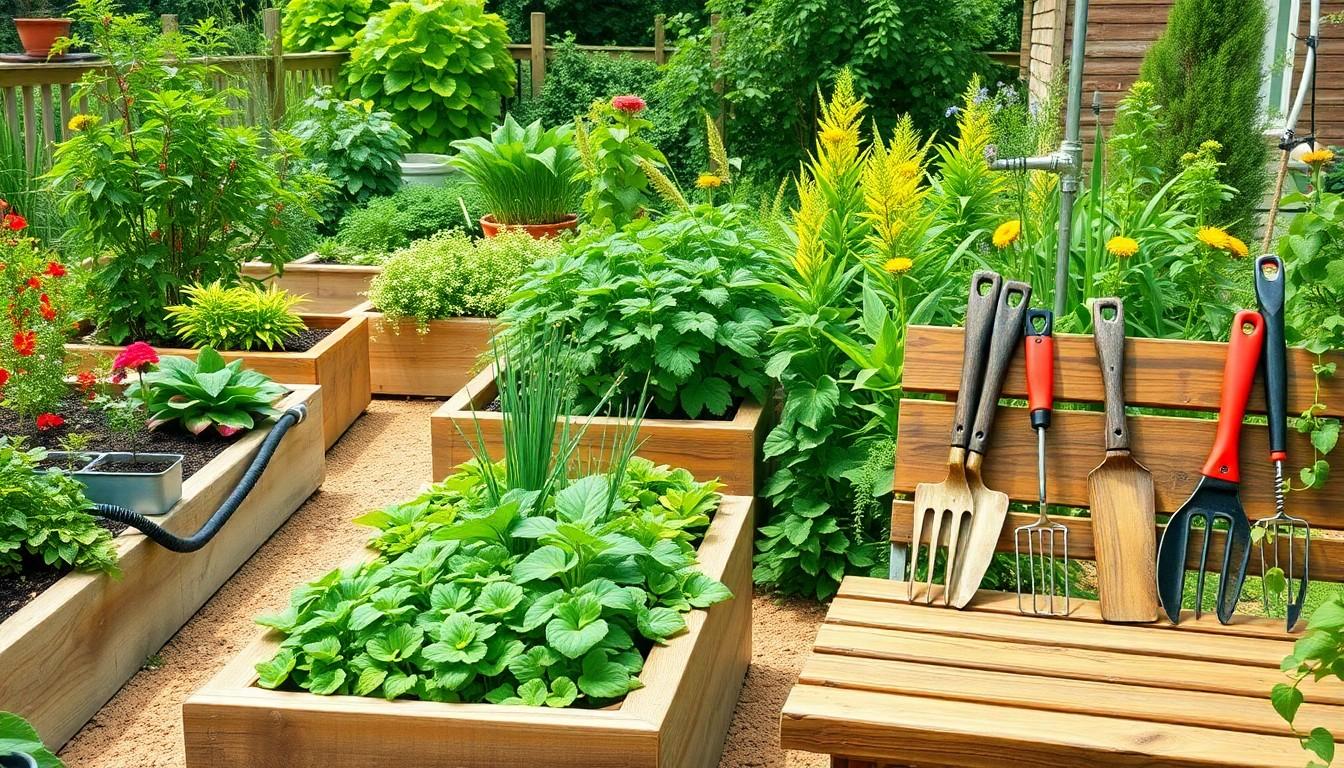
Clever gardening ideas offer numerous advantages for both novice and experienced gardeners. These benefits enhance the gardening experience, making it more productive and enjoyable.
Time-Saving Techniques
Time-saving techniques streamline gardening tasks. Utilizing raised beds reduces the time spent on soil preparation. Implementing drip irrigation systems significantly cuts down watering time while ensuring plants receive adequate moisture. Additionally, successional planting speeds up the harvest cycle, allowing for multiple crops in one season. Keeping tools organized in a designated space minimizes downtime. These strategies create a more efficient gardening routine, freeing up valuable time for other activities.
Cost-Effective Strategies
Cost-effective strategies provide financial benefits. Using compost for soil enrichment reduces the need for expensive fertilizers. Growing plants from seeds instead of purchasing seedlings lowers initial expenses. Companion planting decreases pest-related losses, leading to higher yields without additional costs. Additionally, repurposing materials for garden beds and trellises minimizes expenses, promoting sustainability. These practices not only enhance the garden’s productivity but also support adherence to budget constraints.
Clever Gardening Tips and Ideas
Clever gardening tips enhance productivity and enjoyment for gardeners. Implementing a variety of strategies can lead to a rewarding gardening experience.
Tip 1: Companion Planting
Companion planting involves pairing certain plants to enhance growth and deter pests. For instance, marigolds repel nematodes and attract beneficial insects. Combining tomatoes with basil often improves flavor and growth. Consider using beans with corn, as beans fix nitrogen in the soil, benefiting the corn.
Tip 2: Vertical Gardening
Vertical gardening maximizes space by growing plants upwards. This method is ideal for small gardens or patios. Utilizing trellises or hanging planters can help. Many gardeners use vertical gardening to grow cucumbers, peas, and strawberries, all of which thrive in this setup.
Tip 3: Using Nutrient-Rich Soil Amendments
Nutrient-rich soil amendments improve soil health and support plant growth. Adding compost enhances soil structure and fertility. Incorporating worm castings provides essential nutrients. Many gardeners mix organic matter, such as shredded leaves or grass clippings, to enrich the soil.
Tip 4: Smart Watering Solutions
Smart watering solutions save time and water while promoting healthy plants. Drip irrigation systems deliver water directly to the roots. Utilizing rain barrels captures rainwater, reducing runoff and conserving resources. Efficient sprinklers can also help maintain soil moisture without waste.
Tip 5: Pest Control with Natural Remedies
Natural remedies for pest control ensure a safer environment. Introducing beneficial insects like ladybugs can keep aphid populations in check. Alternatively, neem oil provides an effective barrier against pests. Spraying a soap solution on affected plants often eliminates spider mites and other nuisances.
Tip 6: Recycled Garden Decor
Recycled garden decor adds personality while promoting sustainability. Old wooden pallets serve as vertical planters. Glass jars make unique lanterns or seedling starters. Many gardeners creatively use tires or containers for colorful flower displays.
Tip 7: Season Extension Methods
Season extension methods allow gardeners to extend their growing season. Using cold frames protects plants from frost. Row covers provide insulation while allowing light and moisture. Employing these techniques makes it possible to harvest crops earlier or later.
Tip 8: Container Gardening
Container gardening enables urban dwellers to grow plants in limited spaces. Selecting suitable containers ensures proper drainage and root development. Herbs, tomatoes, and peppers thrive in pots, making them ideal candidates. Moving containers allows gardeners to take advantage of sun exposure.
Tip 9: Easy-to-Maintain Perennials
Easy-to-maintain perennials offer long-term beauty with minimal effort. Varieties like daylilies, sedums, and coneflowers provide seasonal interest. Once established, these plants require minimal care. Including a mix of perennials ensures garden color year-round.
Tip 10: Mulching to Retain Moisture
Mulching helps retain soil moisture while suppressing weeds. Organic mulches, like shredded bark or grass clippings, enrich the soil as they decompose. Applying a two to three-inch layer around plants reduces evaporation. Newly planted beds benefit significantly from proper mulching.
Tip 11: Crop Rotation for Soil Health
Crop rotation improves soil health and reduces pest issues. Alternating plant families each season minimizes nutrient depletion. Rotating crops prevents the buildup of pathogens in the soil. Many gardeners follow a simple rotation plan to maintain balance and health.
Tip 12: Creating Microclimates
Creating microclimates can enhance plant growth within a garden. Positioning taller plants strategically provides shade for smaller varieties. Enclosures like fences can block harsh winds, protecting sensitive plants. Utilizing these techniques allows gardeners to grow diverse crops.
Tip 13: Gardening with Children
Gardening with children fosters a love for nature and learning. Simple projects, like planting seeds or decorating pots work well. Engaging kids in gardening teaches responsibility and patience. Together, families grow edible plants, turning lessons into delicious meals.
Tip 14: Joining Community Gardening Groups
Joining community gardening groups creates opportunities for connection and knowledge sharing. Local gardens often provide resources and support for gardeners of all experience levels. Workshops and events educate participants on best practices. Collaborating with fellow gardeners enhances skills and fosters friendships.
Connection with Nature
Embracing clever gardening tips can truly transform the gardening journey. By integrating creativity and practical strategies, gardeners can tackle challenges while enhancing their enjoyment of the process. These innovative ideas not only improve productivity but also foster a deeper connection with nature.
Whether it’s through companion planting or utilizing vertical space, each tip offers a unique solution to common gardening issues. As gardeners experiment with these techniques, they’ll likely discover new ways to cultivate their green spaces effectively. Ultimately, the right approach can turn any garden into a thriving oasis that brings joy and satisfaction.

